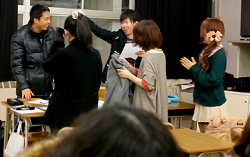Brain reserve
The ongoing developmental potential of the brain does not mean that the adult continues to learn. Science has also confirmed the "use it or lose it" adage, "showing that the brain grows stronger from use and challenge" (Cohen, 2006, p. 82). The inverse means that the brain starts to decay when the adult stops actively developing it. In other words, declarations that adulthood is a period of decline can be correct for those who stop learning; the day an individual stops learning is when the individual’s brain starts to die.
Use it or lose it
Citing evidence for the “use it or lose it” adage, University of South Wales Researcher Michael J. Valenzuela (Valenzuela, 2005) declares, "It is never too late to build brain reserve." In an international meta-analysis that integrated data from twenty-two studies and 29,000 subjects, Valenzuela found that complex mental activity throughout life keeps the brain healthy and growing while reducing the risk of dementia by nearly 50%. In other words, adults who actively engage in education, have intellectually challenging jobs, and engage in a mentally stimulating lifestyle are more likely to keep their brains healthy, reducing the risk of Alzheimer's and other degenerative brain diseases.
Build brain reserve throughout life
This brain reserve is neither static nor influenced by early life experiences; adults can build brain reserve at any stage of life. Valenzuela found that "after five weeks of memory-based mental exercise, participants increased brain chemistry markers in the opposite direction to that seen in Alzheimer's disease" (Valenzuela, 2005).
Active learning protects the brain
Similarly, research on the brains of Catholic nuns conducted at Rush Alzheimer's Disease Center report found that active learning seems to protect the brain, with a 1% increase in cognitively stimulating activities reducing the risk of Alzheimer’s disease up to 33% (Rush University Medical Center, 2002). A key finding in the Rush research points to repetition as a means to improve cognitive skills and prevent brain damage.


![Neurogenesis: The hippocampus is a brain cell factory that daily generates thousands of stem cells, which act like seeds of new brain cells. Our actions and choices determine if those stem cells sprout to become viable brain cells. Active learning engourages new stem cells to strengthen, sprout branches that connect with existing brain cells, and become viable cells that foster creative longevity and perpetual development. Doing nothing means, the seeds of development liquefy and we start to decay. [Image: Harvard Medical] Neurogenesis](http://donnach.com/images/article/neurogenesis_700.jpg)


